There is a creeping scientism in our intellectual climate.
We have been led to think that Science is the gold standard of reliable, substantial knowledge and that institutional science and its leaders are the curators of knowledge. This is of course deeply connected to the wider domination of evolutionary materialistic scientism, which compounds the above with the notion that the stuff studied by the physical and chemical sciences is effectively the limit of credibly, reliably knowable reality.
Where, let us note that scientism is a part of the defining cluster of naturalism, in both its metaphysical and “methodological” guises. We can readily see that in that ever so humble source, Wikipedia, speaking confidently and comfortably on its own philosophical bent:
“Naturalism can intuitively be separated into an ontological and a methodological component,” argues David Papineau.[3] “Ontological” refers to the philosophical study of the nature of being. Some philosophers equate naturalism with materialism. For example, philosopher Paul Kurtz argues that nature is best accounted for by reference to material principles. These principles include mass, energy, and other physical and chemical properties accepted by the scientific community. Further, this sense of naturalism holds that spirits, deities, and ghosts are not real and that there is no “purpose” in nature. Such an absolute belief in naturalism is commonly referred to as metaphysical naturalism.[4]
Assuming naturalism in working methods as the current paradigm, without the further consideration of naturalism as an absolute truth with philosophical entailment [–> as in, let’s keep it implicit], is called methodological naturalism.[5] The subject matter here is a philosophy of acquiring knowledge based on an assumed paradigm.
Notice, the latter point, suitably highlighted: “[T] he subject matter here is a philosophy of acquiring knowledge based on an assumed paradigm.”
Telling.
But, in fact, all of this is ill-informed.
Science, insofar as it creates large scale explanatory constructs, is inherently unable to rise to the first level of responsible certainty, moral certainty. That is, theories and models are inherently highly provisional and are subject to correction or replacement based on logical critique or empirical observations. That’s why we talk about paradigm shifts and scientific revolutions. Today’s dominant school of thought can become tomorrow’s dead theory, often one funeral at a time.
Scientific observations of course can indeed be morally certain, but that is if they are the testimony of reliable witnesses, not because they are scientific. This is part of why observations test and can overthrow theories. Models don’t even aspire to the possibility of truth, they only hope to give good enough results in some domain of practice or other.
So, too, we can see that the tendency to view for instance Mathematics as a Science in the modern sense, is ill-founded. Core mathematical facts and necessary realities are necessary truths or entities, they are far more strongly warranted than scientific frameworks or even observations.
Similarly, nominalism (especially as regards mathematics) is questionable. It is of course the default view of most mathematical practitioners that the substance of their practice is embedded in reality, is somehow real although abstract so that core mathematical entities and their properties are discovered rather than invented, notably if one makes a paper mobius strip and cuts it around in the centre vs 1/3 way across, one gets a dramatically different result. And again, those contrast with cutting around an ordinary cylindrical loop of paper. There are many, many other cases.
This has been challenged by nominalists, who tend to dismiss the reality of abstracta, or to hold that abstraction is “merely” a concept we form to collect phenomena we perceive as somehow related, in effect a form of words. Some would hold that the reality of mathematical entities is that we hold them in our minds (whatever such minds are and however they arise). In this context, axiomatisations then effectively determine mathematical truth as what comes from successful axioms, as we play the collective intellectual game we term Mathematics. Thus the study of the logic of structure and quantity is the focus, the notion that there is a substantial body of discoverable substance independent of our culturally influenced thought and invention is deprecated or even dismissed. As the Standford Encyclopedia of Philosophy outlines:
Nominalism about mathematics (or mathematical nominalism) is the view according to which either mathematical objects, relations, and structures do not exist at all, or they do not exist as abstract objects (they are neither located in space-time nor do they have causal powers). In the latter case, some suitable concrete replacement for mathematical objects is provided. Broadly speaking, there are two forms of mathematical nominalism: those views that require the reformulation of mathematical (or scientific) theories in order to avoid the commitment to mathematical objects (e.g., Field 1980; Hellman 1989), and those views that do not reformulate mathematical or scientific theories and offer instead an account of how no commitment to mathematical objects is involved when these theories are used (e.g., Azzouni 2004) . . . .
In ontological discussions about mathematics, two views are prominent. According to platonism, mathematical objects (as well as mathematical relations and structures) exist and are abstract; that is, they are not located in space and time and have no causal connection with us. Although this characterization of abstract objects is purely negative—indicating what such objects are not—in the context of mathematics it captures the crucial features the objects in questions are supposed to have. According to nominalism, mathematical objects (including, henceforth, mathematical relations and structures) do not exist, or at least they need not be taken to exist for us to make sense of mathematics. So, it is the nominalist’s burden to show how to interpret mathematics without the commitment to the existence of mathematical objects.
Such nominalism, however, is problematic. In a sense, such is unsurprising, all philosophically tinged schools of thought bristle with difficulties so that a key method of philosophy is comparative difficulties. However, it is arguable that in mathematics, nominalism goes a bridge too far. We can readily see that the results of making and cutting paper loops in particular ways are independent of our views, understanding, axiom systems and the like. In fact, if an axiom system would contradict the facts of structure and quantity we see on the ground, it would be severely challenged as unrealistic and likely irrelevant. More could be said, but enough is on the table that we can see why so many practitioners are firmly convinced that there is a discoverable substance of structure and quantity that is there, albeit not concrete. There is no mental or technological tool or instrument that would allow us to spy out a realm where we find a repository holding for example THE null set.
And we already see by the above, that the domain that studies degree of warrant, reliability and certainty of knowledge claims is not science, but philosophy. This is part of the task of Epistemology, one of its branches.
So, first, we must recognise the limitations of science and that the ideology of evolutionary materialistic scientism is self referentially incoherent (as Rosenberg so aptly but inadvertently demonstrates) and necessarily false. The self-refuting is logically falsified. It is worth quoting Rosenberg in his own voice, as a reminder:
Alex Rosenberg as he begins Ch 9 of his The Atheist’s Guide to Reality:
>> FOR SOLID EVOLUTIONARY REASONS, WE’VE BEEN tricked into looking at life from the inside. Without scientism, we look at life from the inside, from the first-person POV (OMG, you don’t know what a POV is?—a “point of view”). The first person is the subject, the audience, the viewer of subjective experience, the self in the mind. Scientism shows that the first-person POV is an illusion. [–> grand delusion is let loose in utter self referential incoherence] Even after scientism convinces us, we’ll continue to stick with the first person. But at least we’ll know that it’s another illusion of introspection and we’ll stop taking it seriously. We’ll give up all the answers to the persistent questions about free will, the self, the soul, and the meaning of life that the illusion generates [–> bye bye to responsible, rational freedom on these presuppositions]. The physical facts fix all the facts. [–> asserts materialism, leading to . . . ] The mind is the brain. It has to be physical and it can’t be anything else, since thinking, feeling, and perceiving are physical process—in particular, input/output processes—going on in the brain. We [–> at this point, what “we,” apart from “we delusions”?] can be sure of a great deal about how the brain works because the physical facts fix all the facts about the brain. The fact that the mind is the brain guarantees that there is no free will. It rules out any purposes or designs organizing our actions or our lives [–> thus rational thought and responsible freedom]. It excludes the very possibility of enduring persons, selves, or souls that exist after death or for that matter while we live.>>
Next, we must recognise that without people, there is no science. People, able to think rationally, responsibly and with significant freedom, a freedom that is morally governed by duty to truth, right reason, prudence, fairness etc. That is, we see here that it is inescapably true that we have minds of our own, minds that are utterly transcendent relative to what blindly mechanical and/or stochastic GIGO-limited, computing on a computational substrate, its organisation and software can do. Computers are refined, organised rocks and they have no dreams; rational, reflective, active, contemplative thought is beyond such. Even a profoundly deluded mind rises above mechanistic and/or stochastic computation, through self-awareness:
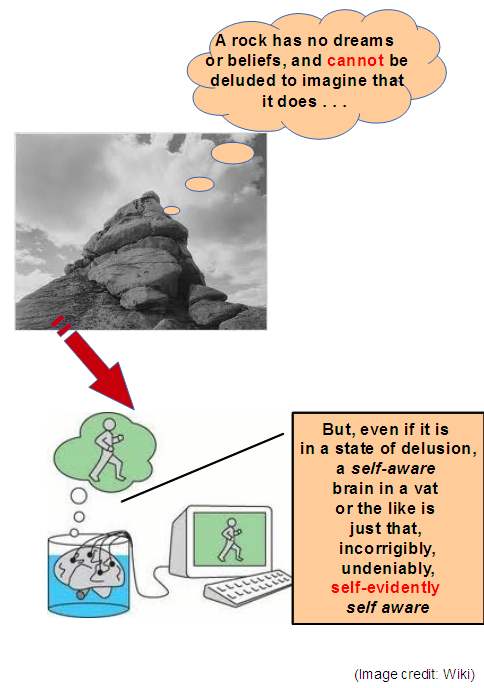
Thus, as reasoning we have reason to take seriously the view that the brain is an interface, not the de-limiting computational substrate. The Smith, two-tier controller cybernetic bio-bot model can help us catch a glimpse of how that might be:
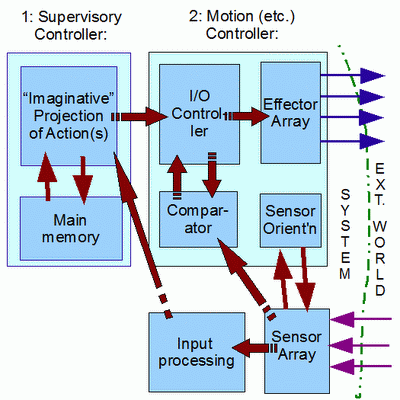
We therefore look at other philosophical issues, recognising that just to reason, we face the inescapable truth that we must have minds of our own, minds that have properties drastically different from those of dynamic-stochastic systems including computational substrates. Reppert, aptly summarised:
[L]et us suppose that brain state A [–> notice, state of a wetware, electrochemically operated computational substrate], which is token identical to the thought that all men are mortal, and brain state B, which is token identical to the thought that Socrates is a man, together cause the belief [–> concious, perceptual state or disposition] that Socrates is mortal. It isn’t enough for rational inference that these events be those beliefs, it is also necessary that the causal transaction be in virtue of the content of those thoughts . . . [But] if naturalism is true, then the propositional content is irrelevant to the causal transaction that produces the conclusion, and [so] we do not have a case of rational inference. In rational inference, as Lewis puts it, one thought causes another thought not by being, but by being seen to be, the ground for it. But causal transactions in the brain occur in virtue of the brain’s being in a particular type of state that is relevant to physical causal transactions.
Recall, our ability to be responsibly, freely rational is antecedent to science and is a condition we must implicitly accept just to credibly do scientific and linked mathematical reasoning. Therefore, it is not explanatorily empty to accept on reasoned reflection that we have reason to accept that mind reflects an order of reality that transcends the picture painted by scientism or by evolutionary materialism.
So, we now look at questions from another branch of core philosophy, the logic of being, i.e. ontology, a sub-discipline of metaphysics which studies being. What sort of thing must mind be to have the properties that are inescapable if we are to have a consensus-building community of rational, credible discussion?
We find that conscious, self-aware, reflective, volitional, conscience guided, more or less intelligent, rationally and morally governed mind is our first fact; the fact through which we process others. So, such things are inescapably certain, in many ways.
Where also, one of the empirical observations we make, is that design exists and often has in it highly reliable signs of intelligent, purposeful design that we may observe. Where also as contingent creatures, we cannot delimit possible intelligences. So, we know that where we see reliable signs of design, we are warranted to infer that as best explanation, indeed, as a scientific inference, that intelligently directed configuration — design — is a material causal factor. In the world of life, this immediately comes out when we notice the genetic code and its role in protein synthesis.
Code:
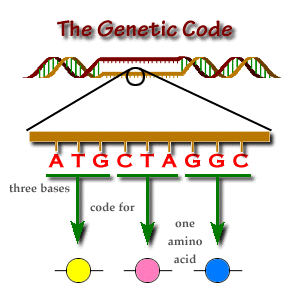
Synthesis:
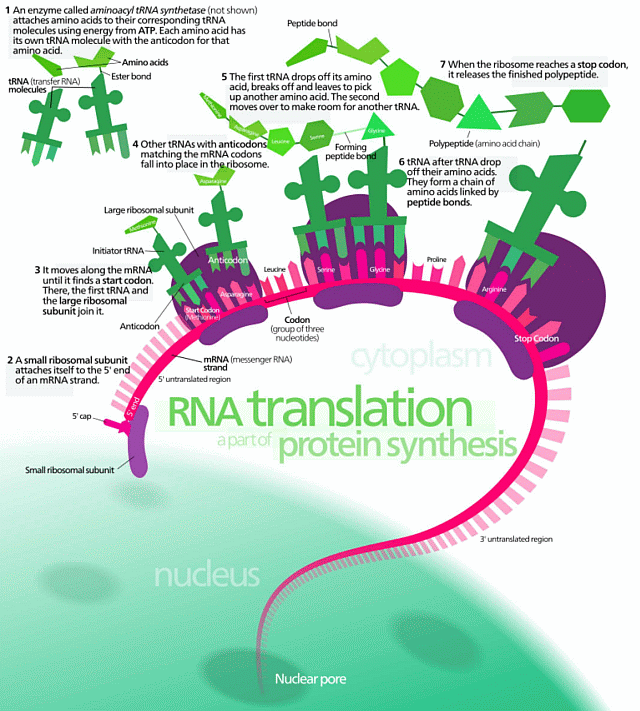
Going further, the observed cosmos and its physics are pervaded with fine tuning, a strong sign of design. Where also atomic matter and the mathematics of cosmology point to contingency of being. As Luke Barnes summarises:
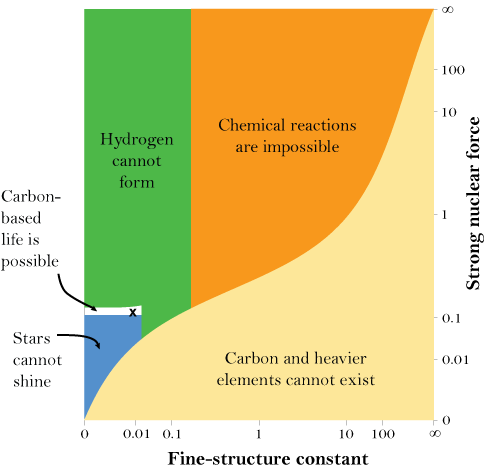
We need a deeper root of reality than the physical world we inhabit. One that can accommodate designers.
This is pointing to mind as antecedent to matter.
Also, as we are minded, embodied, contingent, morally governed creatures, we see that the roots of reality reflect properties of mindedness (intelligence, purpose, creative synthesis are components of designing) AND moral properties. This points to mind that is of moral character sufficient to ground our moral government. All of this is reasoned thought, not empty, woolly speculation on culturally available myths.
Evolutionary materialistic scientism (aka Naturalism) and its fellow travellers, simply cannot sufficiently address what we face in confronting and trying to understand reality. We need a fresh start as a civilisation. END